There may be spoilers.
Director: John Huston
Screenplay: John Huston (based on the novel by B. Traven)
Starring: Humphrey Bogart, Walter Huston, and Tim Holt
Images from the 2003 WHV SE release
Fred C. Dobbs is a drifter bumming around Tampico, begging other americans for pesos, and ripping up lottery tickets, while he is offered more of them by this boy (whom he chucks his drink at... just to show you what kind of a guy he is):
Fred is the kind of guy who will coincidentally bump into the same person and ask for more change, since they were kind enough to give him a spare peso the first time. Of course, it's clear that Dobbs doesn't really know how to spend his money very well. Like getting this slick barber job instead of buying food:
With this film and Ace in the Hole, I get the sense there are film noir-ish underpinnings. The Treasure of the Sierra Madre lacks the femme fatale, however, and there are barely any women (even among extras) in the entire film. I think the only women are at the village where Howard (Walter Huston) saves the boy and is made an honorary guest. That would definitely amplify the critique on masculinity, similar to how Dr. Strangelove creates the threat of nuclear holocaust by middle aged men running the world. There are several shots that are lighted very much like film noir:
Dobbs eventually meets fellow drifter Bob Curtin (Tim Holt), and they join a work force. I think it's important to note that Dobbs and Curtin aren't thieves. They are willing to work honestly for their wages, but when their employer runs away without paying them, they hunt him down, beat him up, and take their share. I think it's important that at this stage, they are willing to only take what they need (or maybe they're afraid of getting arrested). I like to think that greed is something that slowly gains control of you. It's like gambling. If I were to put a quarter I happened to have in a slot machine and win $5, would I walk away? Or would I put just one more quarter... then another... and another?
I love the low angles in the film:
I think at this point, Dobbs and Curtin are still honest. It's when they meet Howard and learn of gold that the noose slowly tightens. It's so gradual that they don't even notice. The test for these two men is their temperance. When will they know to quit? Howard is the humble prospector and knows when to quit. He also knows that a gold miner isn't in it to get rich. The idea of getting millions from gold mining is just the fevered dream of a madman.
I like how humble Howard is in this high angle shot looking up at the two young men with their aspirations:
I think the film is almost an adaptation of Daedalus and Icarus. It's certainly a derivative of the old greek myth, and their message is still ignored by countless Fred C. Dobbses running around casinos these days.
It's funny to see how much endurance Howard has over Dobbs and Curtin. It's like they are too busy putting their energy into dreaming instead of walking. Dobbs and Curtin fall for the fool's gold, and start splashing water all over it. Excessive ambition creates naivete, and leads to wasting water. "Water can be more precious than gold" - says Howard.
Eventually, they do find gold, and Howard does a jig that has become so archetypal of prospectors, you don't even have to have seen the film to know it:
Apparently, Paul Thomas Anderson loves The Treasure of the Sierra Madre, and rightly so. Looking at There Will Be Blood, you can see a lot of inspiration from these wonderful low angle shots:
When they are talking about what they'll do after they finish mining, we get more insights into these characters. Howard says this'll be his last prospect, as he's getting old and knows when to quit. Curtin humbly says he'll start a peach ranch and harvest peaches for a living. To counterpoint this, we get Dobbs, who says he'll spend it on the spa and women. When the other two ask what he'll do after that splurge, he says "what do you mean, 'after that'?"
As with any tale of gold mining, greed and paranoia begin to settle in. The three men decide to split the gold into shares right then and there... mostly because of Dobbs' insistence.
In one of the most chilling scenes in the film, Dobbs has rocks cave in on him inside the mine. Curtin rushes to the entrance, pauses, turns around, pauses, and then decides to rescue Dobbs. It is a testament to Curtin's character, and we can see how shaken up he is, not by the incident itself, but by his hesitation. It's as if he was contemplating if Dobbs was even worth saving, and the part of his mind that thought of that frightens him:
Another scene that frightens me is when the stranger, named Cody, appears and wants to start mining himself. The other men have three choices:
1. Kill him.
2. Let him go and call authorities, who will take their goods.
3. Let him work with them and have a cut of the share.
They decide they will all shoot him. I find this very unsettling, since the group agreed that killing a man for gold was justified:
Fortunately, their morality is saved by bandits, who show up and deliver the most famous lines in the film:
"Badges? We ain't got no badges. We don't need no badges! I don't have to show you any stinkin' badges!" |
Mr. Bogart's ability to ramp up his paranoia is really something. It begins with small mutters to himself about how the others are conspiring to get his share:
This becomes threatening Curtin, who accidentally stumbles on his stash (from a great low angle shot):
And when Howard leaves to help out at the village and stays a week, Dobbs and Curtin must journey together, where Dobbs' paranoia tips them into a battle to stay awake:
Curtin eventually loses out, and Dobbs makes his move:
He non-lethally shoots Curtin twice, and in one of my favorite shots, we see him consumed over his "murder":
Mr. Bogart's scene where he debates whether to bury the body or not is an inspired piece of insanity. He discovers the body's gone, and he presumes incorrectly that the "tiger" must've got him:
Dobbs is a classic case of "flying too close to the sun," "biting off more than you can chew," or whatever idiomatic phrase you prefer. In the end, his ambition exceeds his ability and this will be his downfall.
I think Ace in the Hole is a greater film, but The Treasure of the Sierra Madre is still a great film nonetheless. I think the film has more humanity to it, because in Ace in the Hole, there are maybe 2 very minor characters that are morally sound. Here, we have Curtin and Howard, who gladly accept the loss of their gold:

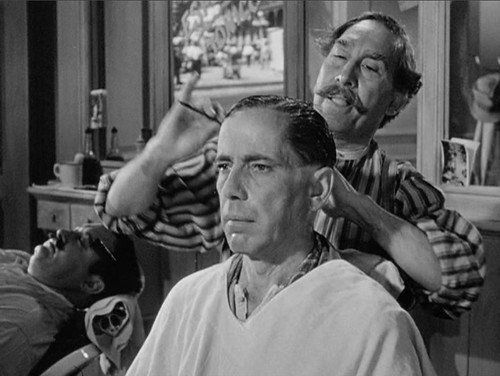
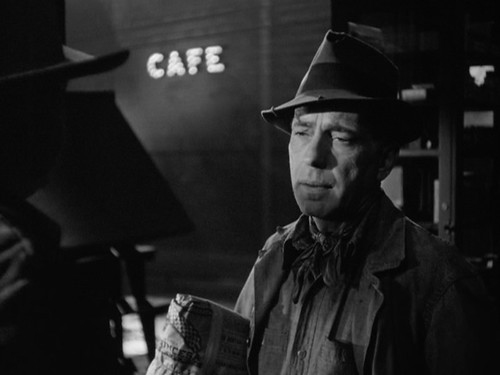
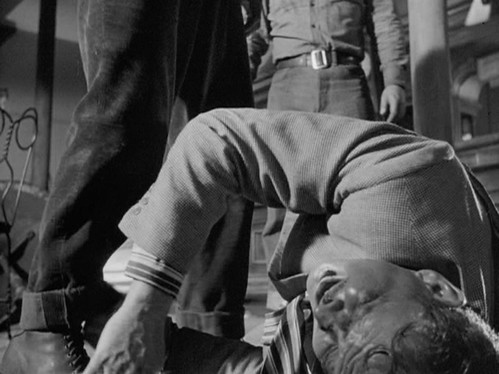
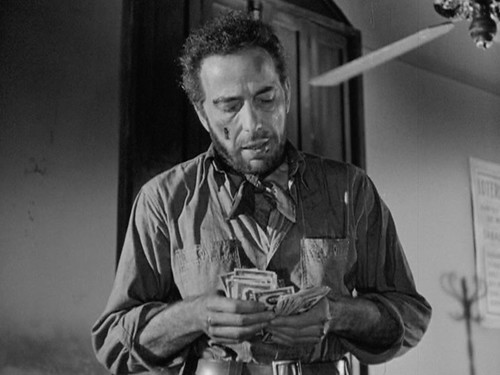
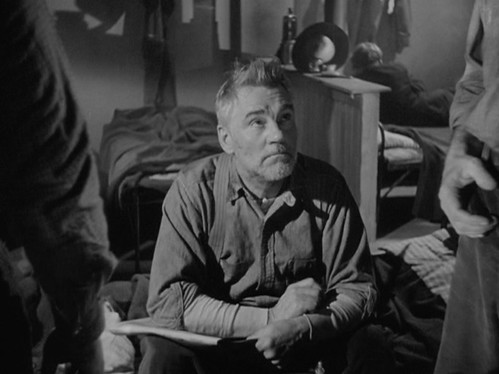
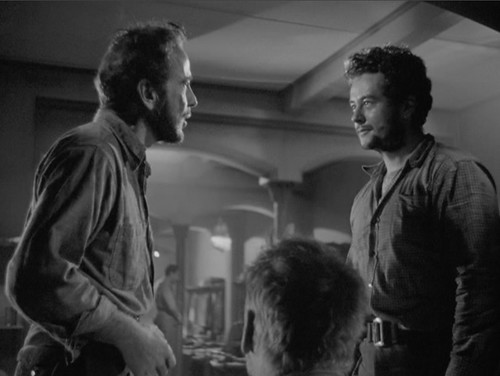
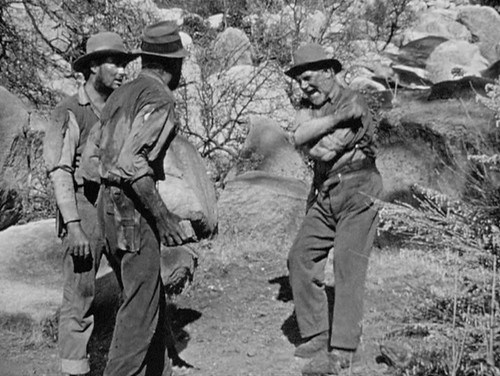

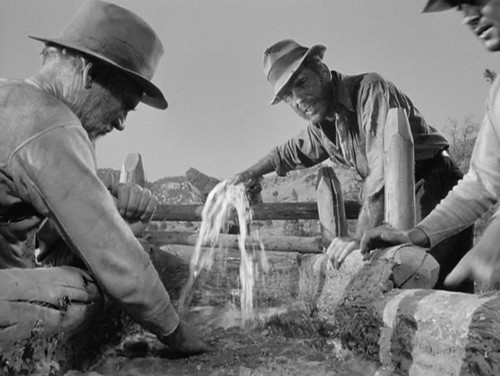

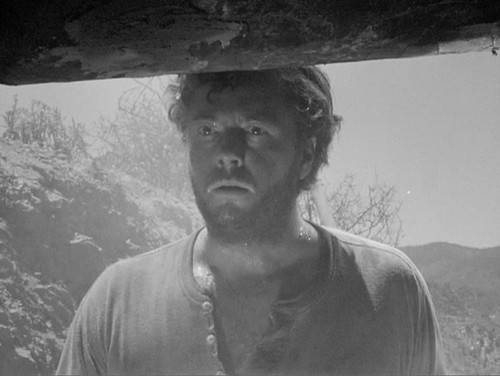
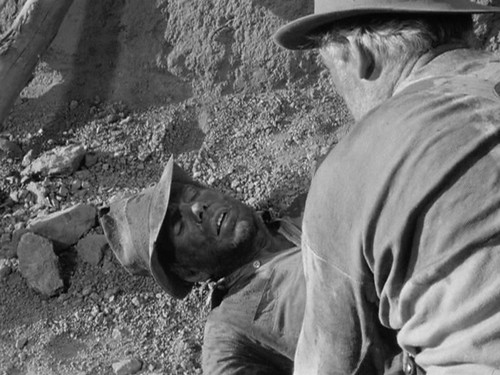

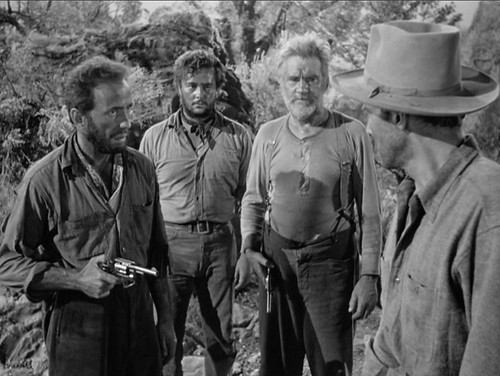

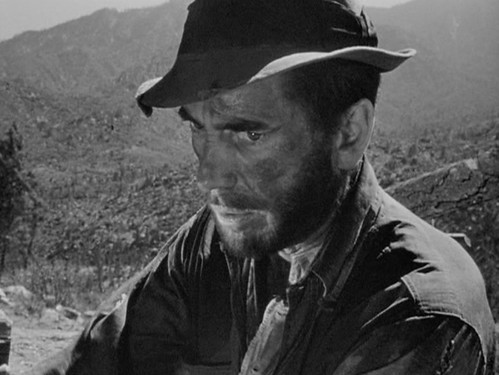
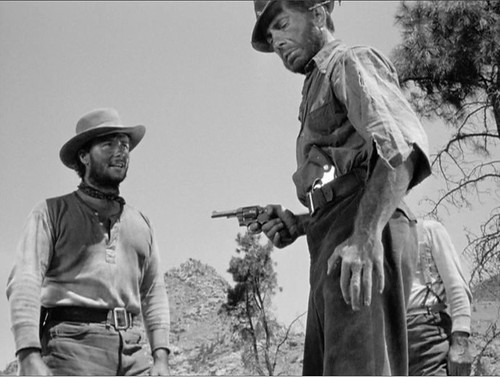
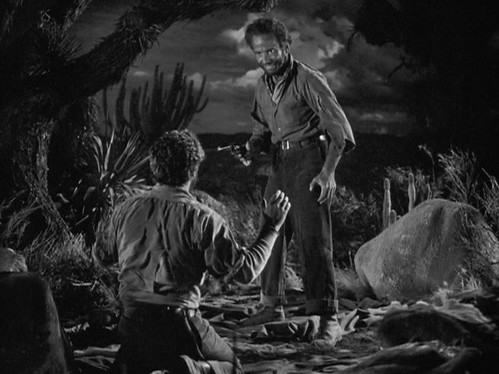

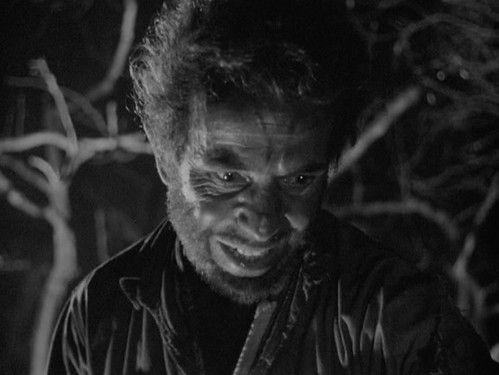
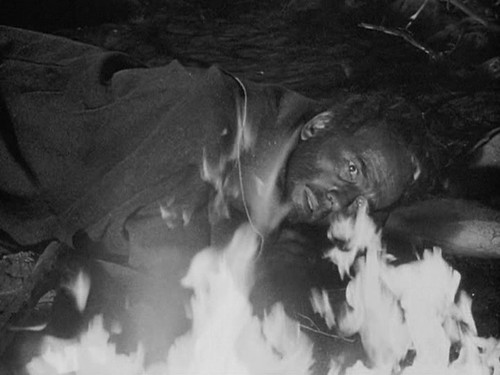
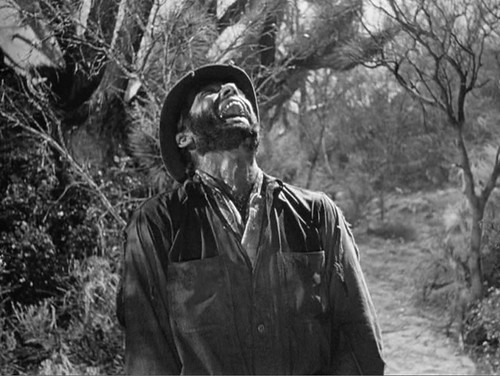
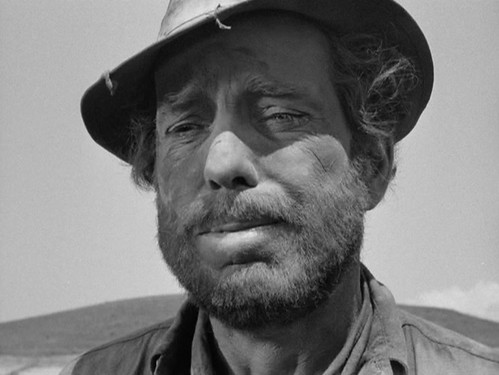
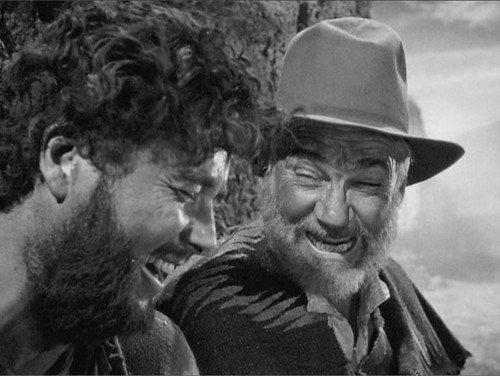
No comments:
Post a Comment